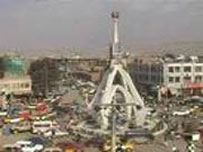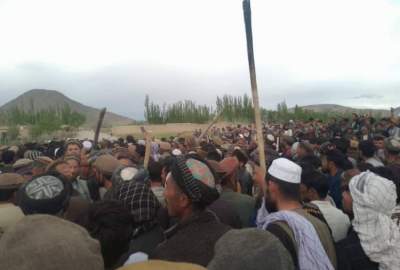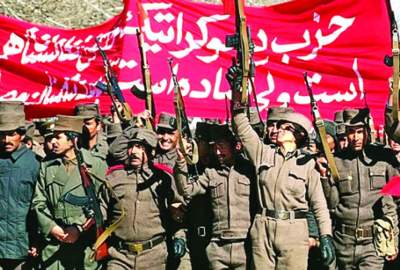This situation may soon alter as a passionate female journalist, Fawzia Fakhri, along with two of her friends, started a Women Journalism Centre two months ago with the aim of training female journalism graduates and helping them find media-related jobs.
Publish dateThursday 27 May 2010 - 09:51
Story Code : 18878
Given a chance, each graduate from a journalism faculty would surely want to practice journalism.
But, this is not the case in the western Herat province of Afghanistan, where female journalism graduates from Herat University – about 20 women a year – end up teaching in schools for lack of positions in local media or because of social pressure.
This situation may soon alter as a passionate female journalist, Fawzia Fakhri, along with two of her friends, started a Women Journalism Centre two months ago with the aim of training female journalism graduates and helping them find media-related jobs.
“We are trying to help these women find a (media) job so that they can practice their work in an environment they feel comfortable with,” said Ms Fakhri, the director of the recently established centre.
Ms Fakhri established the centre with support from two of her journalist friends, Masume Hasan, who is working for a newspaper published by the International Security Assistance Force, and Parwana Alizade, working for Deutsche Welle Radio.
“There are other journalism centres in Herat, but men would not inform us, so we decided to create our own,” she added.
The new centre, which currently hosts trainings and meetings among its 10 members, is just the beginning.
A journalist by choice, Ms Fakhri, a single woman in her early 30s, is past countless upheavals to where she stands now.
In a country like Afghanistan, it isn’t always easy for a woman like her to get exposed to the public as her profession demands.
As a young and successful student, she graduated from Grade 12 in 1996.
She immediately found herself in the faculty of dentistry in Kabul, with the hope of becoming a doctor, only to be interrupted two months later as the Taliban seized power and banned women from holding jobs, attending universities and going outside their homes unescorted.
She then joined a nurses’ school, the only option opened for a medical career at the time, but never practiced it.
All along, she listened to radios such as BBC and Voice of America, which actually inspired her and ultimately dragged her to journalism.
She vowed to report the turmoil of her country: “Hearing those women, journalists, reporting from war zones, I wanted to be the voice on air, covering stories by myself. I wanted to hold the microphone and get interviews.”
After the Taliban’s fall, Ms Fakhri went back to university to pursue her dream, but she didn’t dare to share it with her family at the time.
“I told my father I was studying English, since it was also a part of the literature faculty,” she said, adding, “One month after, I informed him of my field of study, and he agreed.”
However, not all in her family support her way of life.
Her younger brother is critical of his sister because he believes that what Ms Fakhri is doing goes against Afghan social and traditional practices.
Today, after four years as a newscaster for radio Sahar – an all-women radio – and contributing to Radio Watandar and a few local magazines, Ms Fakhri decided to help other women who made the same choice as hers.
After resigning from the radio, she has now been devoting her time as a trainer for an international non-Governmental organization specializing in media, besides spending her time and energy at the newly founded centre.
At this stage, the journalism centre, which has already received four computers from the Italian Provincial Reconstruction Team, will require more support to implement all its projects.
Ms Fakhri’s dreams are boundless: “I would like to create an internet café for women. Right now, none has a proper connection, and women must sit with men, which is not appropriate. We also look forward to exhibiting photographs by women, and publish a booklet which can be sold to visitors.”
UNAMA
But, this is not the case in the western Herat province of Afghanistan, where female journalism graduates from Herat University – about 20 women a year – end up teaching in schools for lack of positions in local media or because of social pressure.
This situation may soon alter as a passionate female journalist, Fawzia Fakhri, along with two of her friends, started a Women Journalism Centre two months ago with the aim of training female journalism graduates and helping them find media-related jobs.
“We are trying to help these women find a (media) job so that they can practice their work in an environment they feel comfortable with,” said Ms Fakhri, the director of the recently established centre.
Ms Fakhri established the centre with support from two of her journalist friends, Masume Hasan, who is working for a newspaper published by the International Security Assistance Force, and Parwana Alizade, working for Deutsche Welle Radio.
“There are other journalism centres in Herat, but men would not inform us, so we decided to create our own,” she added.
The new centre, which currently hosts trainings and meetings among its 10 members, is just the beginning.
A journalist by choice, Ms Fakhri, a single woman in her early 30s, is past countless upheavals to where she stands now.
In a country like Afghanistan, it isn’t always easy for a woman like her to get exposed to the public as her profession demands.
As a young and successful student, she graduated from Grade 12 in 1996.
She immediately found herself in the faculty of dentistry in Kabul, with the hope of becoming a doctor, only to be interrupted two months later as the Taliban seized power and banned women from holding jobs, attending universities and going outside their homes unescorted.
She then joined a nurses’ school, the only option opened for a medical career at the time, but never practiced it.
All along, she listened to radios such as BBC and Voice of America, which actually inspired her and ultimately dragged her to journalism.
She vowed to report the turmoil of her country: “Hearing those women, journalists, reporting from war zones, I wanted to be the voice on air, covering stories by myself. I wanted to hold the microphone and get interviews.”
After the Taliban’s fall, Ms Fakhri went back to university to pursue her dream, but she didn’t dare to share it with her family at the time.
“I told my father I was studying English, since it was also a part of the literature faculty,” she said, adding, “One month after, I informed him of my field of study, and he agreed.”
However, not all in her family support her way of life.
Her younger brother is critical of his sister because he believes that what Ms Fakhri is doing goes against Afghan social and traditional practices.
Today, after four years as a newscaster for radio Sahar – an all-women radio – and contributing to Radio Watandar and a few local magazines, Ms Fakhri decided to help other women who made the same choice as hers.
After resigning from the radio, she has now been devoting her time as a trainer for an international non-Governmental organization specializing in media, besides spending her time and energy at the newly founded centre.
At this stage, the journalism centre, which has already received four computers from the Italian Provincial Reconstruction Team, will require more support to implement all its projects.
Ms Fakhri’s dreams are boundless: “I would like to create an internet café for women. Right now, none has a proper connection, and women must sit with men, which is not appropriate. We also look forward to exhibiting photographs by women, and publish a booklet which can be sold to visitors.”
UNAMA
Source : Afghan Voice Agency(AVA)
avapress.com/vdcdjj0f.yt0j56me2y.html
Top hits







